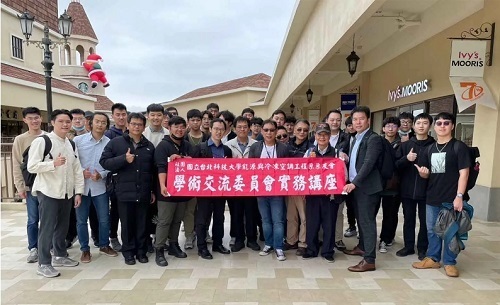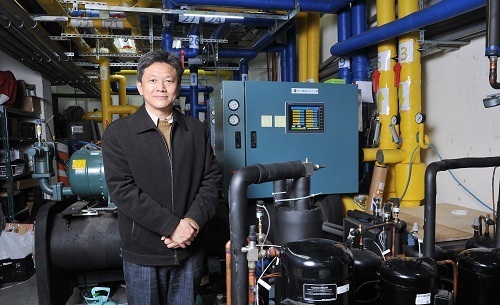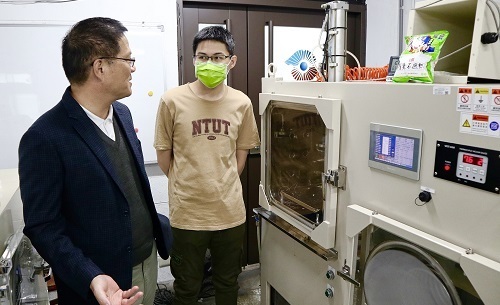2024 NTUT Department of Energy and Refrigeration & Air Conditioning Engineering driving the Industry Towards Net Zero
From food products closely linked to daily life, to advanced high-tech and biotech industries, since its founding 60 years ago, the Department of Energy and Refrigeration Air-Conditioning Engineering at Taipei Tech has been a powerful force behind Taiwan's industrial transformation. Looking ahead to the future of energy-saving and carbon reduction, the development of energy-efficient technologies incorporating AI and digital technology, along with talent cultivation, will play an increasingly crucial role in helping Taiwan’s industries break through and reach new heights.
"In 2006, the Department added 'Energy' to its name, signaling the expansion from traditional refrigeration and air-conditioning technologies to encompass modern energy technologies and sustainable development," said Professor Lee Kuoi-peng, Chair of the Department. As Taiwan's first academic institution dedicated to training refrigeration and air-conditioning professionals, Taipei Tech has continuously aligned its programs with technological trends and industry transformation needs, providing valuable talent for various industries and contributing significantly to technical progress across diverse fields.
Sixty years of talent cultivation, driving the advancement of Taiwan's industries.
Currently, Most of Taiwan's licensed refrigeration and air-conditioning engineers are graduates of Taipei Tech. By grounding students in foundational subjects like thermodynamics, fluid mechanics, and heat transfer, and integrating engineering fundamentals from electrical and mechanical fields, along with application courses in architecture and energy, the department has nurtured a large pool of talent who now play crucial roles in various industries. For example, in high-tech sectors such as semiconductors, panels, ICT communications, biomedical, and food industries, alumni have designed and maintained precise environmental control systems for cleanrooms, ensuring process stability and product quality. In the biotech and healthcare fields, they are responsible for designing and managing low-temperature freezing systems to preserve biological samples and pharmaceuticals, ensuring their safety and effectiveness. Many alumni have also founded manufacturing companies, engineering firms, and technical consulting firms, or hold technical leadership and senior management positions, overseeing the design, energy efficiency, and maintenance of large-scale industrial refrigeration and air-conditioning systems, earning excellent reputations in the industry. For example, the founders and key operators of renowned companies such as Yankey Engineering and Acter, who were instrumental in building high-tech facilities for Taiwan's 'mountains that protect the nation' semiconductor industry, are alumni of the predecessor to Department of Energy and Refrigeration Air-Conditioning Engineering—the Refrigeration and Air Conditioning Group at Taiwan Provincial Taipei Technical College. Furthermore, these alumni are also playing an active role in the emerging energy sector.
Many cutting-edge technologies in various industries, such as the development of high-efficiency refrigeration and air-conditioning systems, cleanroom technology for semiconductors and biomedicine, high-tech manufacturing and process equipment, vacuum technology, cold chain logistics, food refrigeration, CFD airflow simulation, dynamic energy modeling, AI-based chip cooling, and AI-driven energy management and smart control systems, are also the result of active collaborations between the department and industry. Professor Lee Kuoi-peng emphasized, "These collaborations have not only driven technological advancements across various fields but also ensured that our students stay at the forefront of industry trends, nurturing professionals with real-world expertise." Among the department's notable achievements, Professor Hu Shih-cheng's pioneering research on "Cleanrooms and High-Tech Facilities," recognized with the 5th National Award For Distinguished Contribution To Industry-Academia Cooperation, exemplifies the department’s commitment to practical application and societal impact.
From food and construction to high-tech semiconductors, the presence of Taipei Tech's Department of Energy and Refrigeration and Air Conditioning Engineering can be seen across various industries.
Through close industry partnerships, the Department of Energy and Refrigeration Air-Conditioning Engineering has not only driven industrial innovation but has become a key player in supporting industries as they pursue a net-zero future. For example, in Taiwan's semiconductor industry, Professor Li Kui-peng has led the Sustainable Environmental Control Center in close collaboration with semiconductor companies like TSMC, providing LEED energy optimization consulting and research for new factory constructions. Many of the wafer fabs worldwide that have received LEED green building certification were completed with the help of the department’s research.
Additionally, in the critical area of cooling towers for industrial processes, Professor Cai Youxi and his research team used computer modeling to analyze airflow over blades and modify blade designs, successfully reducing energy consumption by about 15%. This collaboration with well-known companies in the air-conditioning and refrigeration sectors, like Jinri Industrial, broke through past technical limitations, improving fan efficiency while significantly reducing noise. Professor Yan Wei-mou, an expert in low-temperature, low-pressure technologies and energy management, has also conducted research on fruit freeze-drying, streamlining the drying process, saving energy, and reducing costs.
Integrating AI and Digital Twin Technologies to Develop Green Talent, Supporting the Net-Zero Transition
As emerging technologies like AI and blockchain continue to evolve rapidly, the Department of Energy and Refrigeration Air-Conditioning Engineering is incorporating these innovations into its research and teaching. Professor Li Kui-peng noted, "Using AI for predictive diagnostics and optimization control can foresee potential issues and adjust in advance, effectively reducing energy consumption." The integration of AI and digital twin technologies into energy optimization design and monitoring has led to the development of techniques that can improve energy-saving effectiveness by more than 30%. These technologies are now being planned for application in high-tech factory construction and maintenance.
Professor Li Da-sheng, a leading researcher in AI-based energy management, has published extensively in this field and actively collaborates with industries. Since 2011, he has introduced AI-integrated energy management systems in 124 factories, fostering a hands-on, industry-academic collaboration model that helps develop practical talents who can effectively apply AI in real-world settings.
Professor Jian Liang-han, Dean of the College of Mechanical and Electrical Engineering and a distinguished professor in the department, emphasized, "Taipei Tech places great importance on aligning educational content with industry needs, focusing on the development of practical skills. The Department of Energy and Refrigeration Air-Conditioning Engineering has specialized programs in refrigeration, air-conditioning, and energy-saving technologies that stand out in the field." For instance, a collaboration with a leading panel manufacturer focuses on improving filter and heat exchanger designs to reduce energy consumption in air-conditioning equipment, integrating smart controls and wide-area detection technologies to further enhance energy efficiency.
Refrigeration and air-conditioning systems account for more than 50% of energy consumption in buildings, making them key to achieving net-zero digital transformation. On the occasion of the department’s 60th anniversary, Taipei Tech will host the "Sustainable Net-Zero Forum" on September 27, exploring the latest trends in AI technology, net-zero buildings, and sustainable development. The department aims to continue leading the development of smart, energy-efficient refrigeration and air-conditioning technologies, contributing to Taiwan’s education and industrial advancement for the next 60 years.



Chinese Resource:https://www.cw.com.tw/article/5131903
